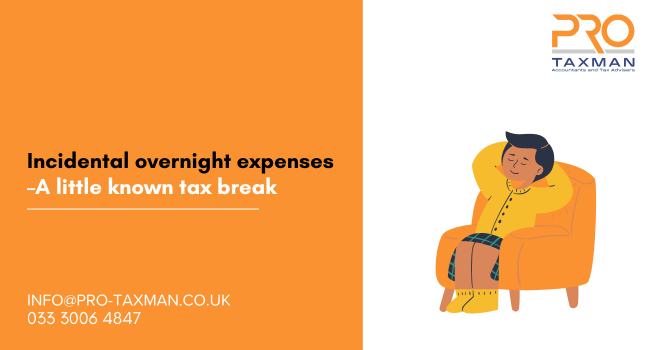Expenses incurred by an employee on behalf of a company can only be reimbursed under the ‘wholly, exclusively and necessarily’ rules for work undertaken ‘in the performance of the duties of or employment’. It is not enough for the expense to be relevant to the job, or to be incurred in connection with the duties of the job. The point of this rule is to prohibit the cost of expenditure that has a private purpose and is therefore taxable as ’emoluments’. Where this situation may pose a problem is in claims for reimbursement of expenses by an employee when travelling for business reasons as sometimes personal expenses will also be incurred.
However, the incidental overnight expenses exemption enables an employer to meet small personal expenses when an employee stays away for work, without the employee suffering a tax charge and without needing to report the expenses to HMRC. Examples quoted in HMRC’s employment manual include newspapers, laundry costs and telephone calls, i.e. small incidental items where a receipt may not be available. A key feature of the exemption is that the employer must reimburse the expense – the relief is unavailable otherwise.
The exemption limit for travel within the UK is £5 per night when there is an overnight stay and £10 per night for overseas trips. The exemption can be applied as long as the total incidental overnight expenses do not exceed the allowance for the entire trip. Importantly, should a payment be made exceeding these limits, the whole payment becomes taxable and not just the excess. However, there are two methods under which a company and its employees can take advantage of this exemption:
1. Make it a company policy that any excess is reimbursed by the employee where personal expenses exceed the limit. The effect will be to bring the whole payment back within the tax exemption.
2. The company can pay a £5 or £10 per night allowance (for UK overnight stays and non-UK overnight stays respectively) for personal costs regardless of whether it is spent. If it is not spent, there is no requirement for it to be repaid and no tax implications for the company or employee.
Employers wishing to pay or reimburse employees’ expenses at a rate other than those set can apply for HMRC’s approval of a ‘bespoke rate’. An application must set out the rate that the employer wishes to pay and demonstrate that the amount is a reasonable estimate of the expenses incurred and that a deduction would usually be allowed in respect of those amounts.
Where additional services are part and parcel of the room tariff and not separately charged, no benefit in kind applies. However, where the company pays for additional facilities e.g. pay-per-view movies or use of the hotel gym or pool, these are taxable on the employee.
Practical point
The incidental expenses allowance relates to employees only. A director can claim if employed by the company but the same cannot be achieved by someone who is self-employed (there being no employee).
Need professional accounting service or tax advice? Contact us to book a 15-min Free Consultation with us today.
To find out more please follow us on Facebook, Twitter, or LinkedIn. Feel free to contact us on 0333 006 4847 or request a call back by texting 075 6464 7474

